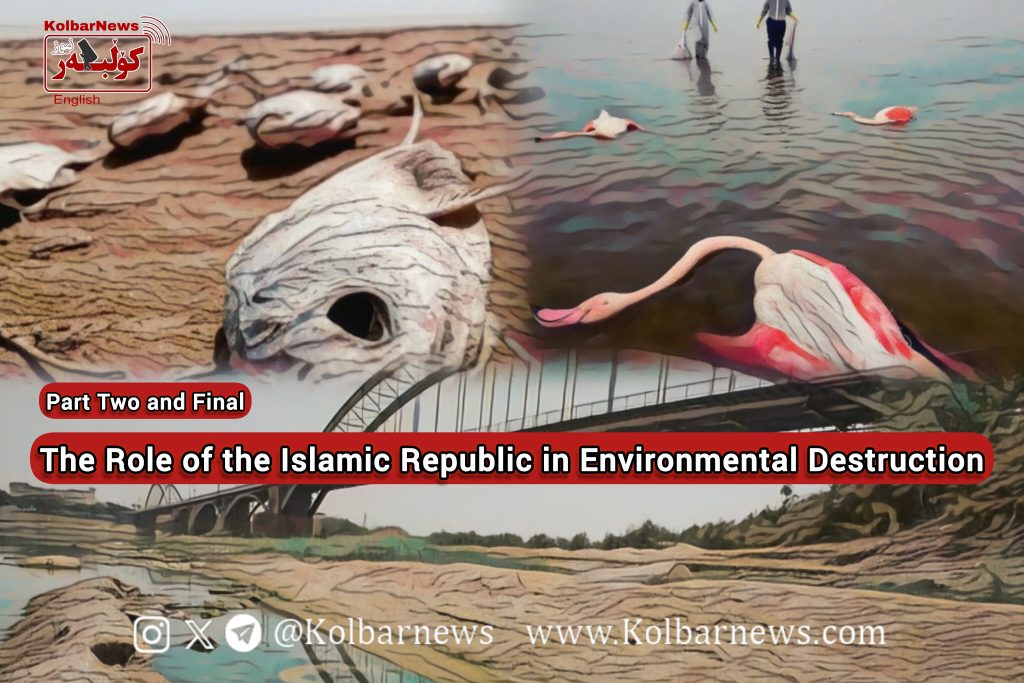Part Two and Final

The Islamic Republic, for numerous reasons, has been recognized as one of the most notorious destroyers of ecosystems in the world. This authoritarian regime is not only responsible for the destruction of Iran’s environment but also views civil environmental defenders as enemies.
By manipulating the ecosystem of Lake Urmia, the Islamic regime has pushed the world’s largest saltwater lake toward destruction. Similarly, the intentional drying up of the Hour al-Azim wetland by the IRGC to exploit its vast oil and gas reserves has led to dust storms affecting multiple provinces. Major cities like Tehran, Isfahan, Mashhad, Ahvaz, and Sanandaj suffer from severe air pollution, caused by outdated vehicles, low-quality fuels, mazut burning, and polluting industries. This regime has made Iran the highest greenhouse gas emitter in the Middle East.
The Islamic government and its Revolutionary Guard Corps (IRGC) have worsened water scarcity and drought by constructing unnecessary dams, allowing excessive exploitation of underground and surface water in agriculture under the illusion of self-sufficiency, and draining rivers, wetlands, and qanats. The IRGC, in pursuit of financial gain, has destroyed vast areas of valuable forests in the north and has burned Kurdish forests under the pretext of security, even eliminating thousands of years-old trees in the Zagros forests. Other environmental crimes of the regime include the destruction of biodiversity, air, soil, and water pollution.
The catastrophic approach of the Islamic Republic to the environment, along with its suppression of organizational rights, has led to the formation of many dissident groups advocating for environmental protection. The regime has brutally cracked down on such activists. IRGC agents tortured and killed Dr. Kavous Seyed-Emami because his team discovered suspicious plants in an operational area, indicating possible nuclear activities. Intelligence operatives, fearing such discoveries and, more importantly, the self-organization of dissident activists, have effectively criminalized environmental defense efforts. This suppression is most evident in Kurdistan, where two forces stand against each other in the battle over environmental preservation.
The Islamic regime is one side of the environmental war in Kurdistan. Since its inception, it has deliberately and systematically sought to destroy Kurdistan’s environment. Burning forests, planting landmines in border areas, shelling mountains and pastures, wasting water and natural resources, excessive mining, transferring toxic waste to the outskirts of cities, polluting rivers, and building military roads atop mountains and hills are just a few examples of the Islamic government’s relentless efforts to damage and destroy Kurdistan’s environment.
Opposing the Islamic regime is the strong and growing Kurdish environmental defense movement. Dozens of organizations and associations have emerged to protect the environment, oppose hunting, defend animal rights, organize educational classes on the necessity of environmental preservation, plant trees, and combat deforestation. With bare hands and minimal resources, they work daily to extinguish forest fires. Dedicated and fearless individuals like Sharif Bajour and his companions have upheld this culture in Kurdish society.
Environmental defense in Kurdistan is closely tied to other struggles against the Islamic government. The right to form gatherings and organizations is the primary demand of Kurdish environmental activists. The widespread participation of women in this movement is inherently linked to demands for gender equality and the abolition of discrimination. Environmental activism is fundamentally an educational movement, aimed at raising public awareness about the need to protect the environment and animal rights. Kurdish environmental activists are among the pioneers of civil and social movements in Kurdistan, facing imprisonment and death for their cause.
Kurdistan is home to thousands of passionate environmental defenders who, under the harshest conditions, remain steadfast in their universal and humanitarian principles. Thousands of Kurdish men and women environmental activists work tirelessly to prevent further pollution, and in times of both natural and man-made disasters earthquakes, forest fires, floods, and water contamination—they are the first to arrive at the scene with minimal resources to rescue and assist humans and other living beings.

